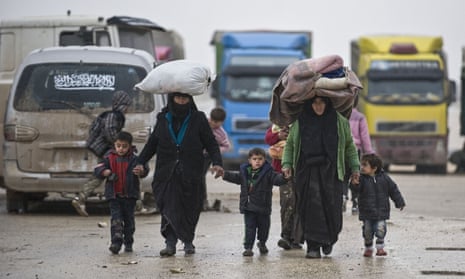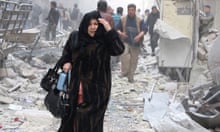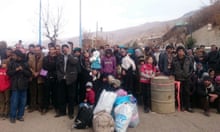Syria’s war is facing a critical few days as refugees stream from Aleppo towards the Turkish border and Russian airstrikes help Bashar al-Assad’s forces advance, with diplomatic moves still showing no sign of concrete measures to relieve the suffering of ordinary people.
International hand-wringing has failed to trigger decisive action with Germany’s chancellor, Angela Merkel, making clear her concern on Monday. “We have been ... not just appalled but horrified by what has been caused in the way of human suffering for tens of thousands of people by bombing – primarily from the Russian side,” she said after meeting Turkey’s prime minister, Ahmet Davutoğlu in Ankara.
Violence on the ground was also the backdrop to last week’s short-lived Geneva peace talks and the London Syria donor conference, where billions of dollars were pledged to pay for the world’s worst humanitarian disaster. Yet neither showed any sign that there was light at the end of the tunnel.
Later this week the International Syrian Support Group, comprising the key countries trying to find a way out of the conflict, is due to meet again – this time in Munich. It may be its last chance to come up with a credible political solution to end the five-year war, diplomats say.
Last September, when Vladimir Putin sent his air force to Syria and claimed to be targeting Isis, western governments were unsure what his plan was. It is now brutally clear that Russia – along with fighters from Hezbollah and Iran – has tipped the balance in Assad’s favour. Rebels are losing ground. The mood in Damascus is defiant again.
In a fast-moving situation, one dramatic element masks others: the current focus on the north means less attention is being paid to the crisis in Deraa in southern Syria – also the scene of massive refugee flows following regime gains aided by Moscow.
“The trajectory for the rebels is downwards, and the downward slope is increasingly steep,” warned Emile Hokayem of the International Institute for Strategic Studies, one of many critics who believe the US is naive about Russian intentions.
Syrian opposition supporters smell treachery. John Kerry, the US secretary of state, is vilified for continuing to insist that only negotiations can end the conflict – while simultaneously sidestepping the central question of Assad’s future – in line with Putin’s position.
“People on the ground feel that the Russian bombing is happening with American consent so they feel betrayed and that is a huge catastrophe,” said Rim Turkmani, a civil society activist. “They say, ‘Would the Russians be doing what they are doing if the Americans were not on board?’ There is a feeling of loss and abandonment.”
Syrians also say they they fear support will bleed away from the mainstream anti-Assad opposition to Jabhat al-Nusra, the al-Qaida affiliated group, which rejects any kind of peace process or negotiated political transition.
Yet a quick resolution still looks unlikely. Even with Russian help Assad’s forces are overstretched and far from victory. And Saudi Arabia and Turkey, the opposition’s main backers, will likely step up their military support – though not to the extent of defying the US and supplying game-changing anti-aircraft missiles.
“My sense is that the regime is trying to advance enough to dictate the terms of a political settlement rather than secure an outright military victory,” said Julien Barnes-Dacey of the European Council on Foreign Relations. Wider western intervention remains unlikely, he believes.
Barack Obama’s leadership is under close scrutiny. On Thursday members of the US anti-Isis alliance are to meet to discuss an offer from the Saudis and their Gulf allies to join the fight against the jihadis on the ground in Syria – a potentially significant widening of the campaign.
Even more important, Kerry’s talks in Munich with Sergei Lavrov, the Russian foreign minister, will indicate whether there will be any Geneva peace talks to return to later in February – as scheduled by the UN envoy Staffan de Mistura. At the very least that would require some kind of humanitarian action – perhaps airdrops of food to relieve Syrians starving in government-besieged areas. Talk of a ceasefire sounds like a fantasy.
Kerry, wrote the al-Arabiya columnist Hisham Melhem, has “a deep and almost mystical belief in the power of diplomacy to settle violent disputes, a belief based on the naïve assumption that his peers are as rational and as well-meaning (as) him”. America had been reduced to “pleading for cooperation” with Russia.
Merkel, more aware than any other European leader of the dimensions of the refugee crisis, pledged that Germany and Turkey would push for all sides to stick to UN resolution 2254, calling for a halt to attacks on civilians. The Syrian opposition insist flatly that without that there will be no negotiations.
It looks like being another action-packed week – in the killing fields of Syria and in the world’s corridors of power. But the end of the war is still nowhere in sight.







